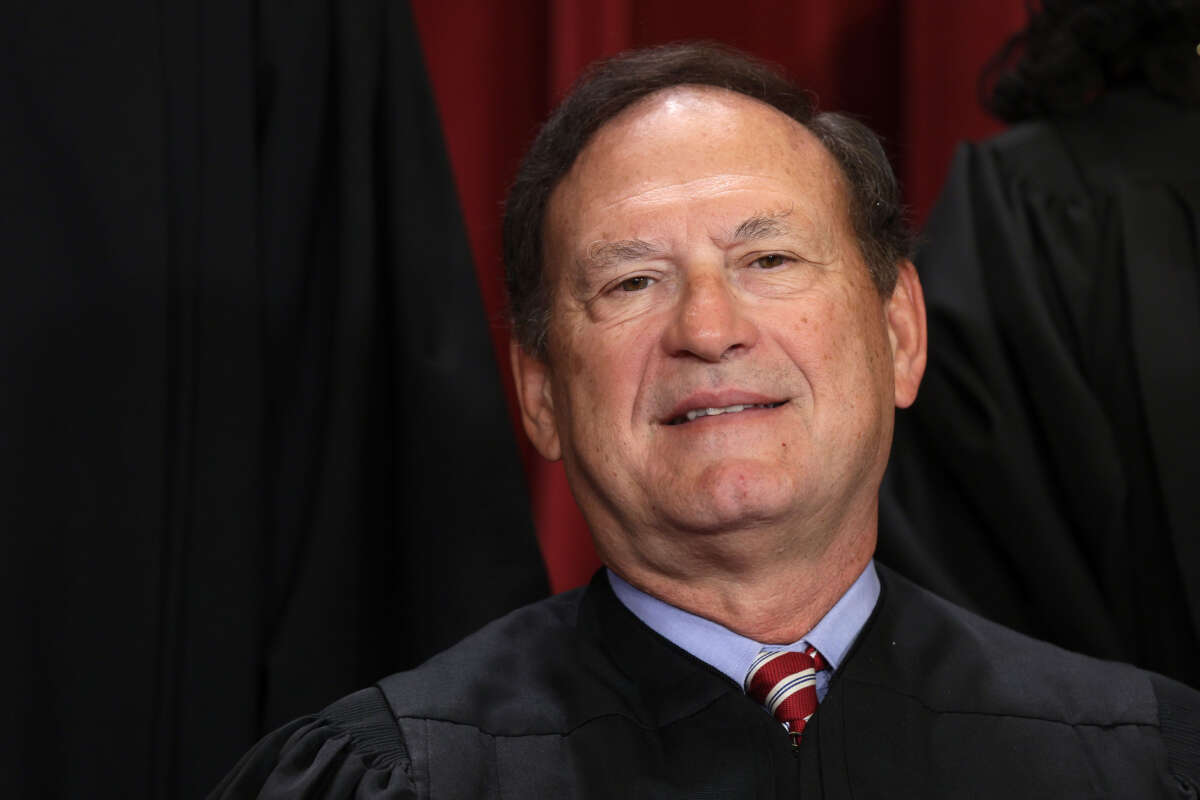Did you know that Truthout is a nonprofit and independently funded by readers like you? If you value what we do, please support our work with a donation.
A former law clerk who worked under Supreme Court Justice Samuel Alito has condemned his decision to stay on cases relating to Donald Trump and defendants involved in the January 6, 2021, Capitol attack, noting that two flags that flew outside of his homes demonstrate enough evidence to question his biases.
The New York Times reported last month that an upside-down United States flag flew outside of Alito’s home less than two weeks after the Capitol attack, and just days after Trump was impeached for his role in inciting it. The symbol is traditionally meant to signal distress, but has been used in recent decades as a sign of political discontent by numerous groups — at the time it was flying at Alito’s Virginia home, it was commonly used by those in support of Trump and his efforts to overturn the 2020 presidential election outcome.
Days after that initial report, The Times uncovered that a second flag flew at Alito’s vacation home in New Jersey. This time, it was the “Appeal to Heaven” flag, a symbol that was common during the Revolutionary War but rarely used since. The flag has been co-opted in the past decade by far right Christian nationalist groups, and was also prominent during the Capitol attack. It flew over the vacation home just last summer.
Democrats on the Senate Judiciary Committee questioned whether Alito should recuse himself over the flags, which could be viewed by some as a clear bias in favor of Trump and the Christian nationalists who attacked the Capitol. Despite legal experts saying otherwise, Alito rejected that notion by claiming “an unbiased and reasonable person” would accept his excuses, that it was his wife, not him, that flew the flags, and therefore he should continue to weigh in on those cases.
Susan Sullivan, who clerked under Alito and is currently a law professor at Temple University, said earlier this week that she was “aghast” when she saw news reports and images of Alito’s homes with these flags in front of them.
In a Wednesday interview on MSNBC, Sullivan said Alito’s actions — including his excuses and rationale for staying on the cases — contradicted her previous view of him being a “man of integrity.”
“It is irrelevant if Mrs. Alito flew it or not. The fact is that flag was there,” Sullivan said, referring specifically to the upside-down flag.
This is not an insignificant symbol. Irrespective of why it is there, who put it there — it shouldn’t have been there. The problem is that flag is incendiary, and it cannot do anything other than raise a reasonable inference of bias.
“[It is] the symbol of these people who attacked the Capitol,” Sullivan explained.
Alito should remove himself from the dockets, she added.
“The stakes have never been higher and recusal is, to me, it just defies logic that one would not recuse themselves from a case like this,” Sullivan said.
An analysis from The Washington Post also indicates that Alito’s excuses don’t add up.
For example, Alito claimed his wife had put up the flag “in response to a neighbor’s use of objectionable and personally insulting language on yard signs.” In a statement to Fox News, Alito added that the signage had also been too close to a school bus stop, further upsetting his wife.
But that point is rather moot, considering that school children had been staying home for months at that point due to the coronavirus pandemic. The spat between Martha-Ann Alito and the neighbor also did not occur until mid-February, according to that neighbor.
Critics responded to Alito’s refusal to recuse by blasting his inconsistencies.
“Justice Alito’s story conflicts with the accounts of other people involved, and the Supreme Court — uniquely in all of government — has no mechanism for getting to the truth. If the Court won’t create one, then we need to,” said Sen. Sheldon Whitehouse (D-Rhode Island), a member of the Judiciary Committee.
Amanda Frost, a law professor at the University of Virginia, reached the same conclusion.
“I agree that Justice Alito’s wife has a First Amendment right to express her views. But if she does so on their shared property, in a way that would lead a reasonable person to question his impartiality, then he should respond by recusing himself,” Frost told the Times last week.
Media that fights fascism
Truthout is funded almost entirely by readers — that’s why we can speak truth to power and cut against the mainstream narrative. But independent journalists at Truthout face mounting political repression under Trump.
We rely on your support to survive McCarthyist censorship. Please make a tax-deductible one-time or monthly donation.
